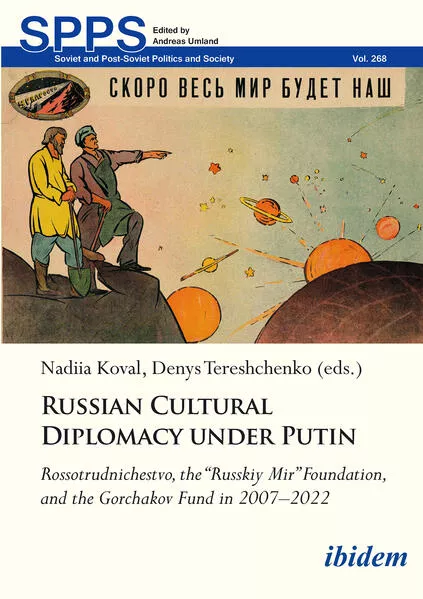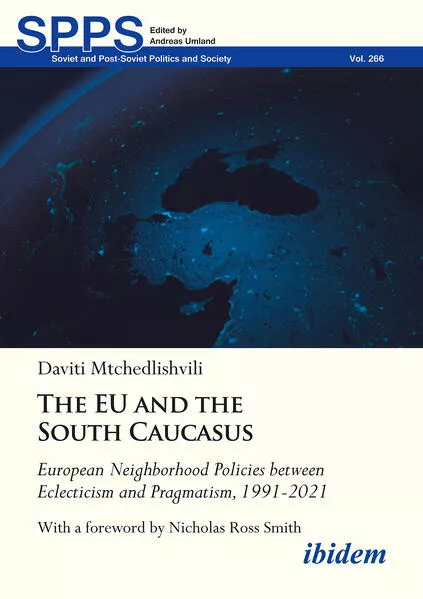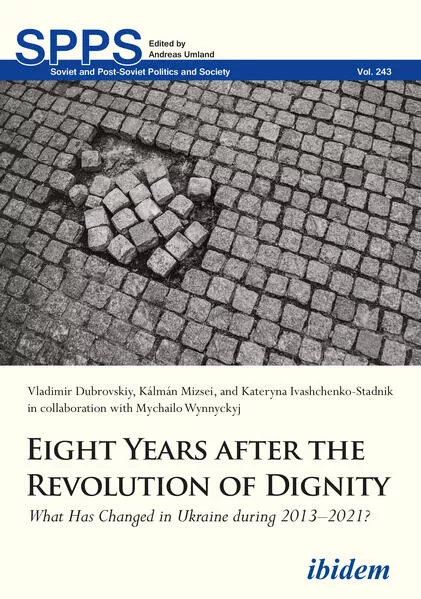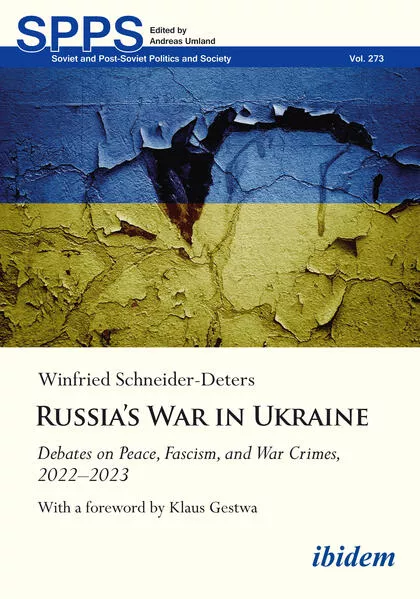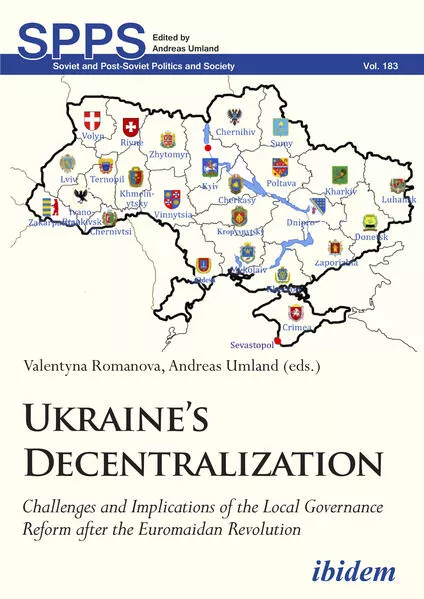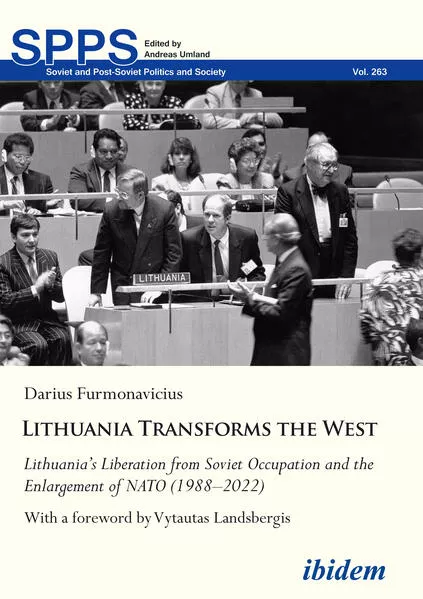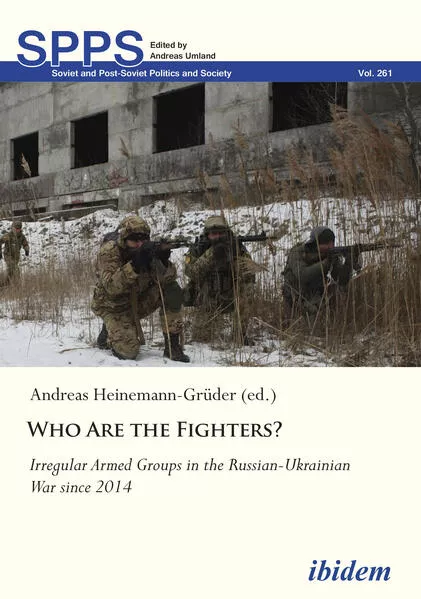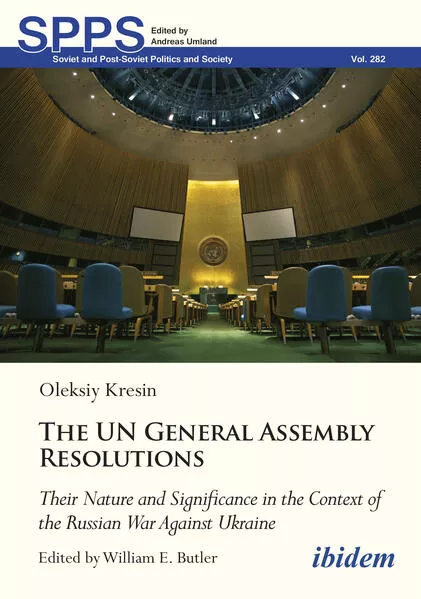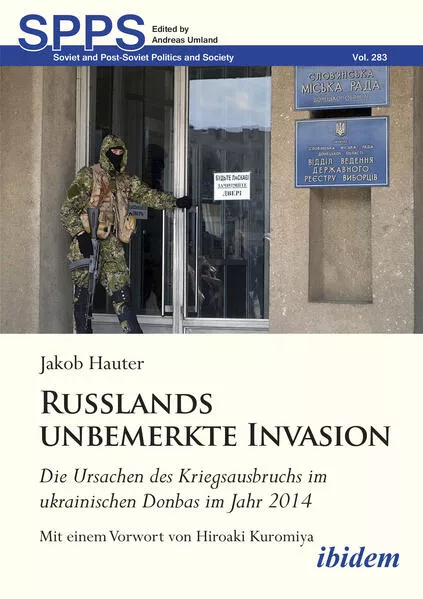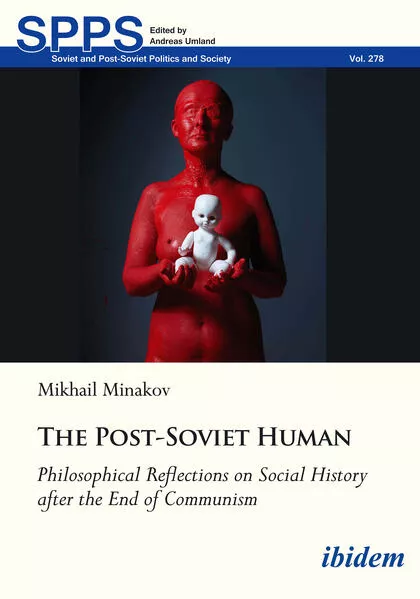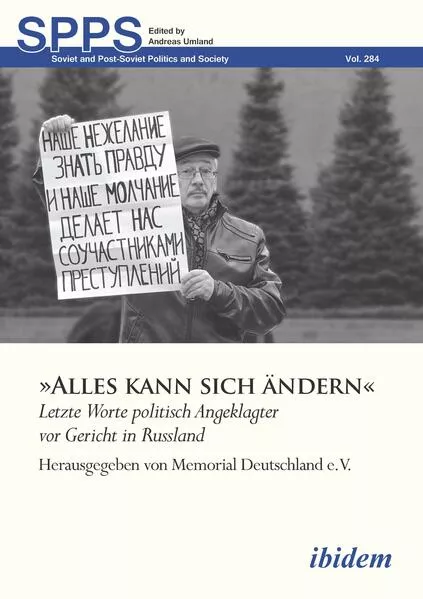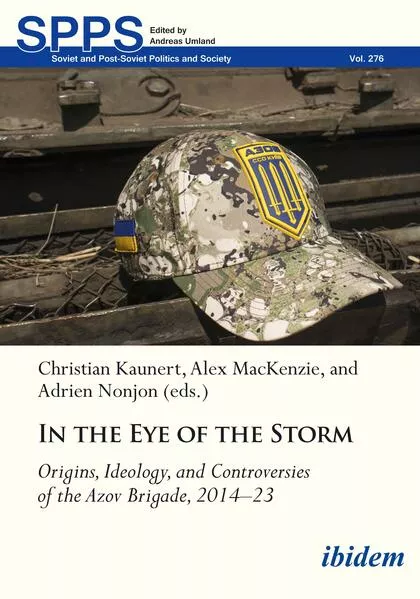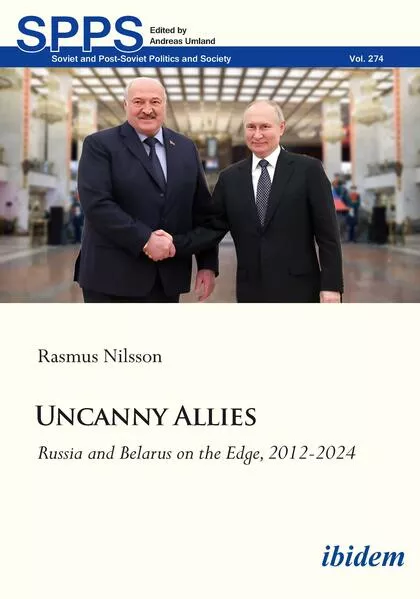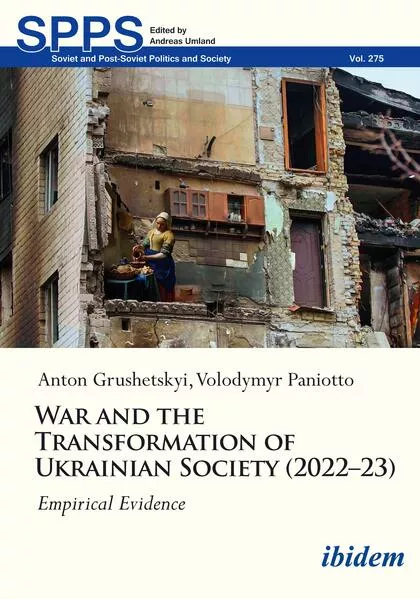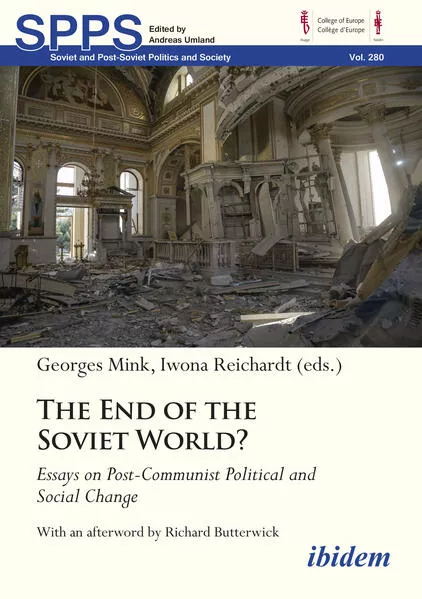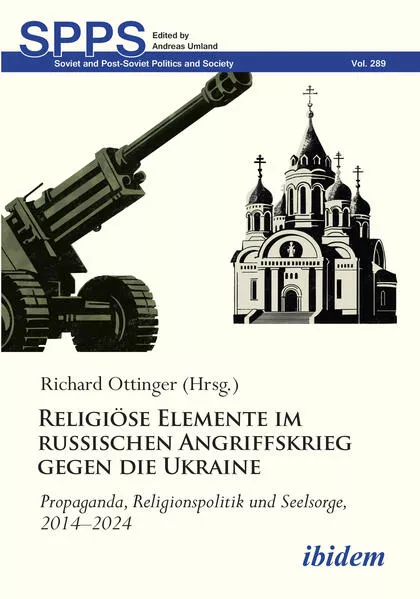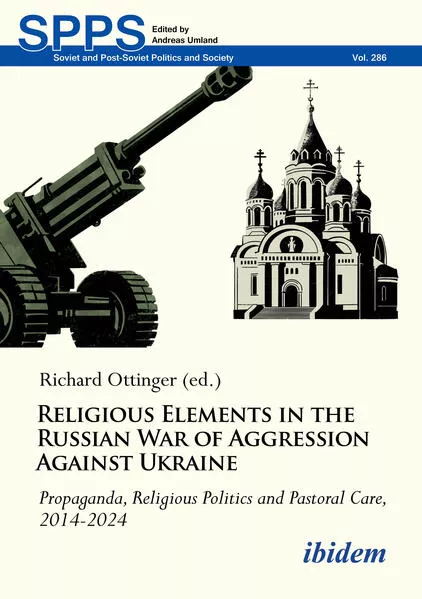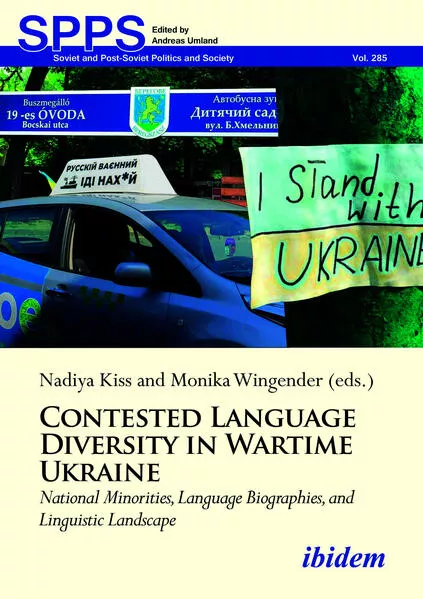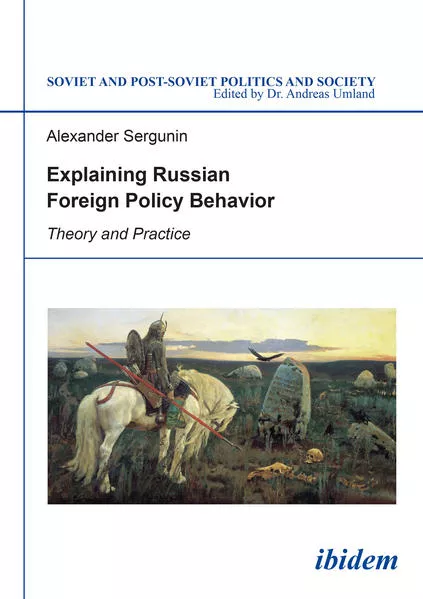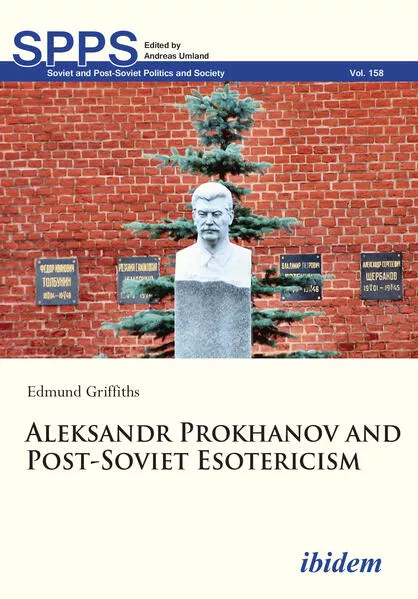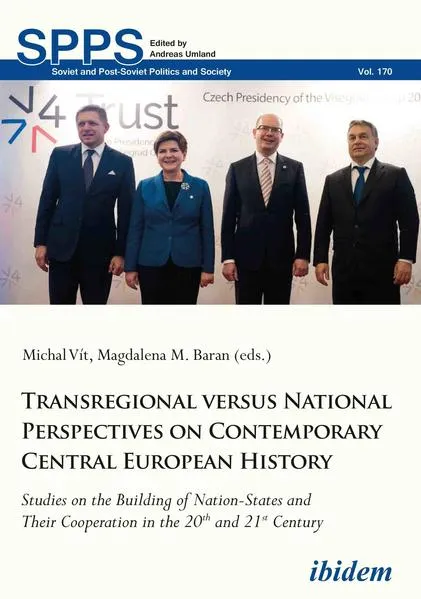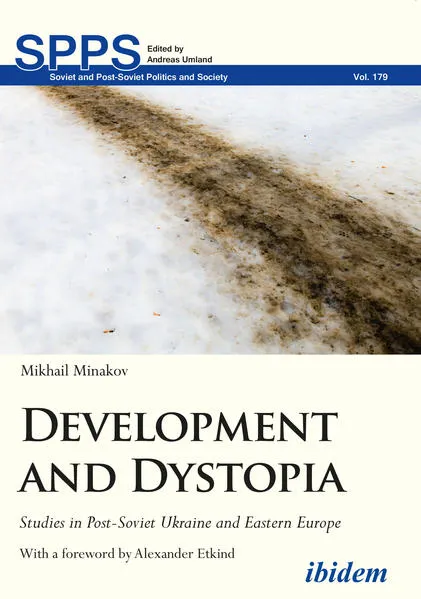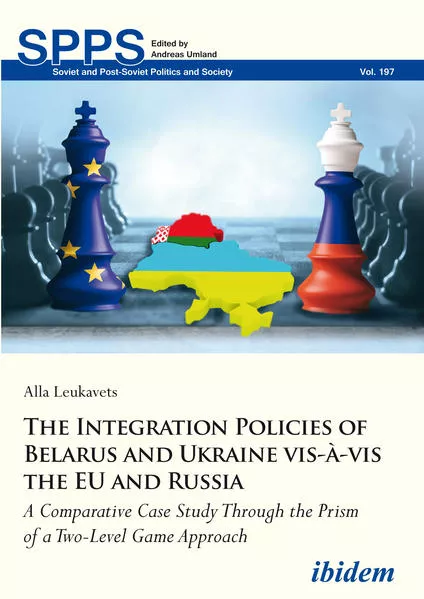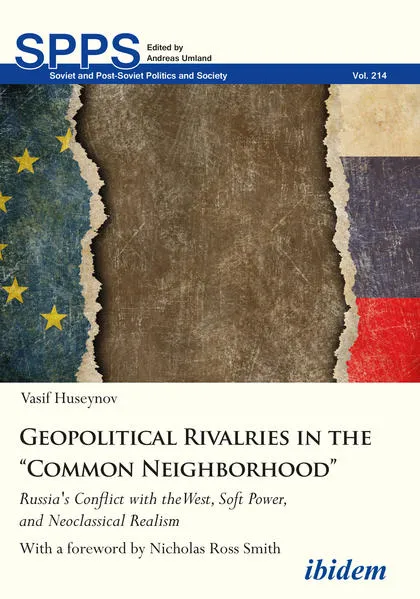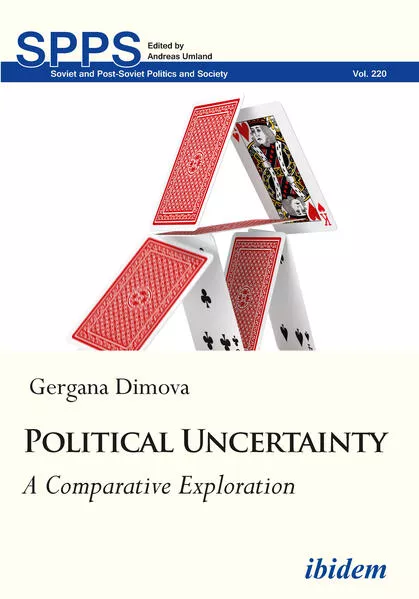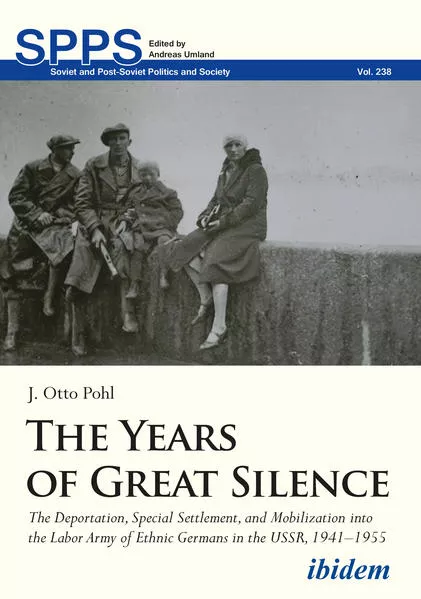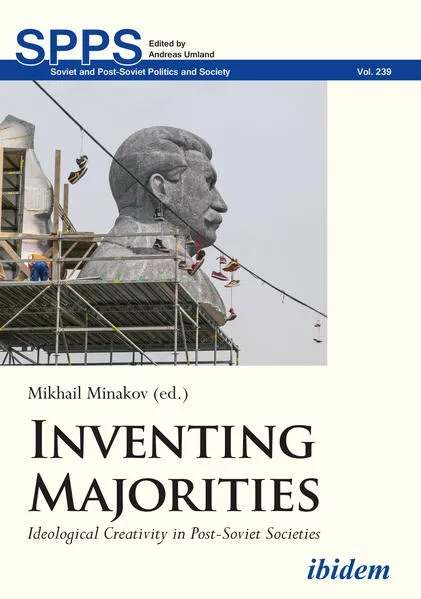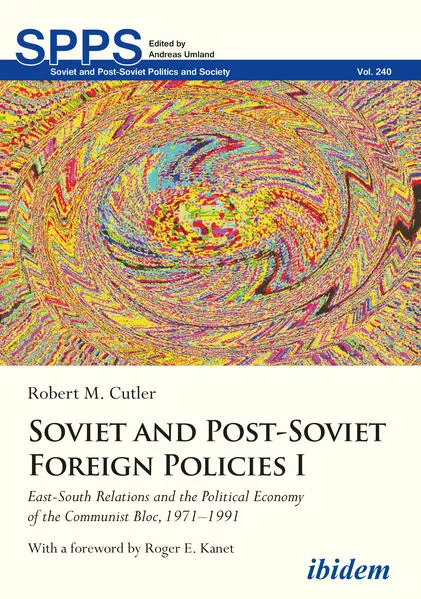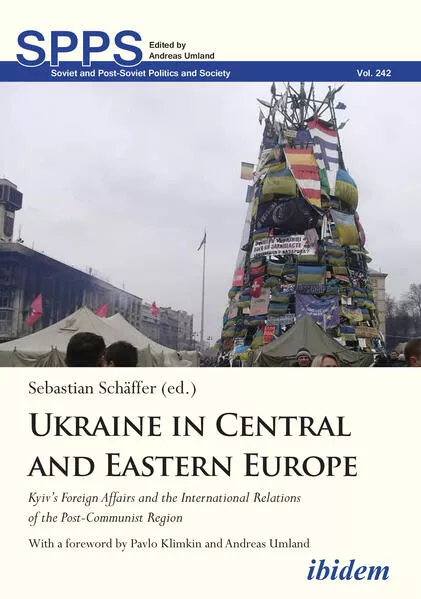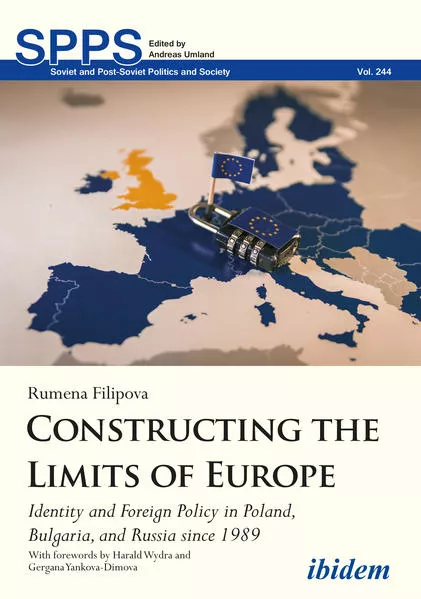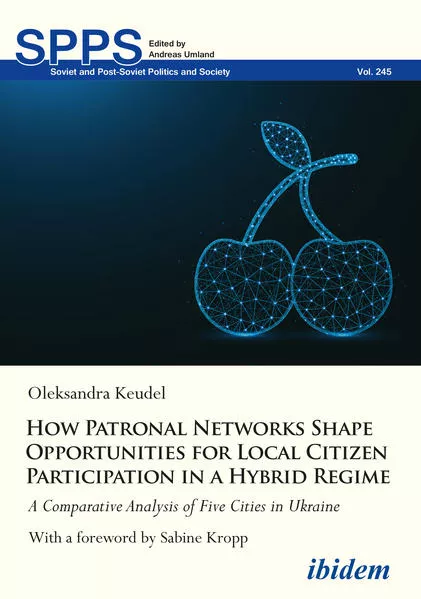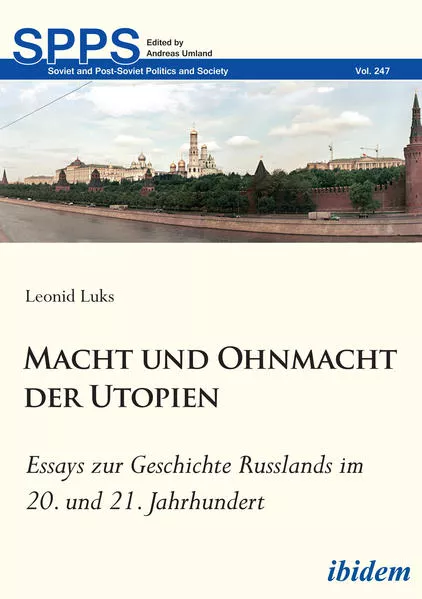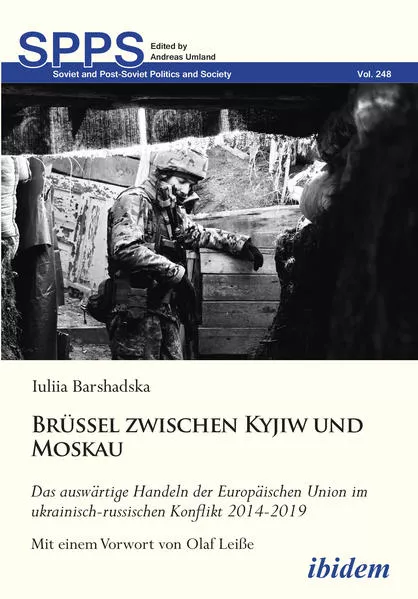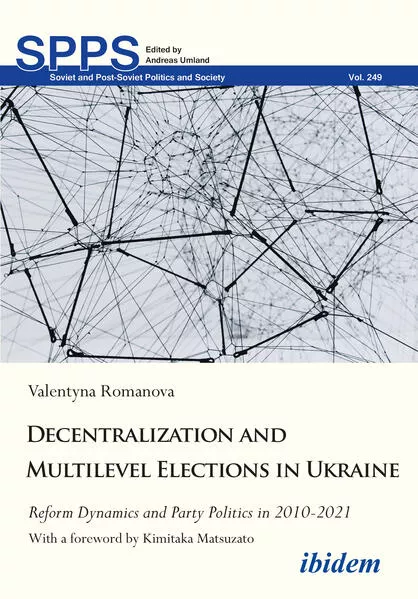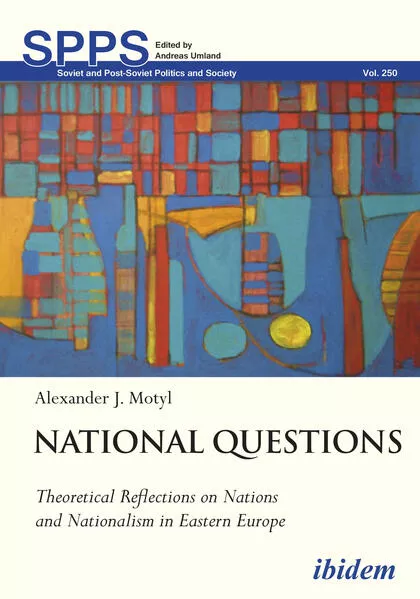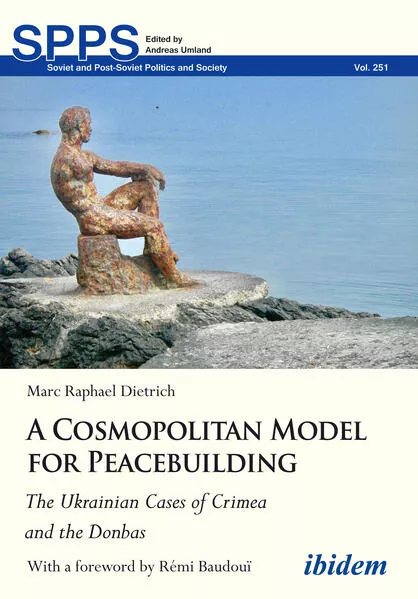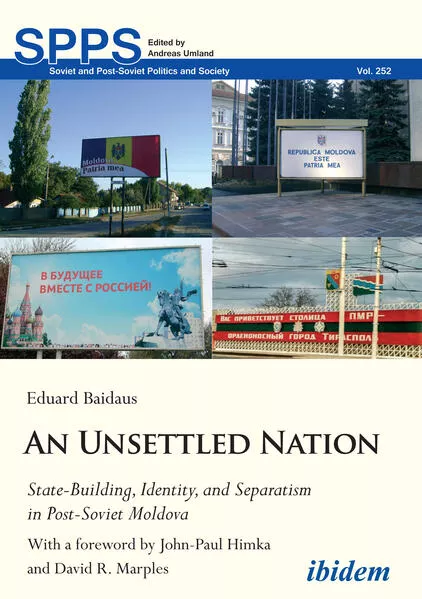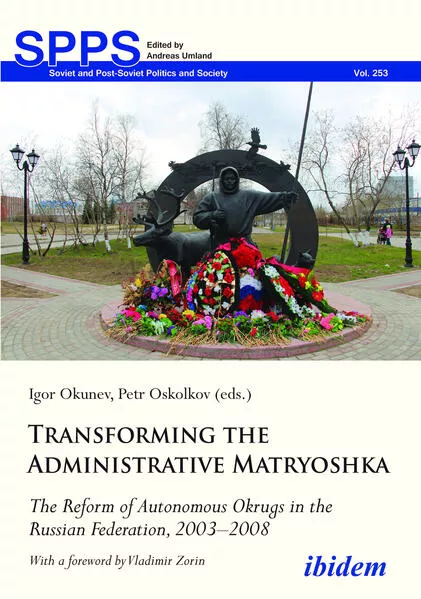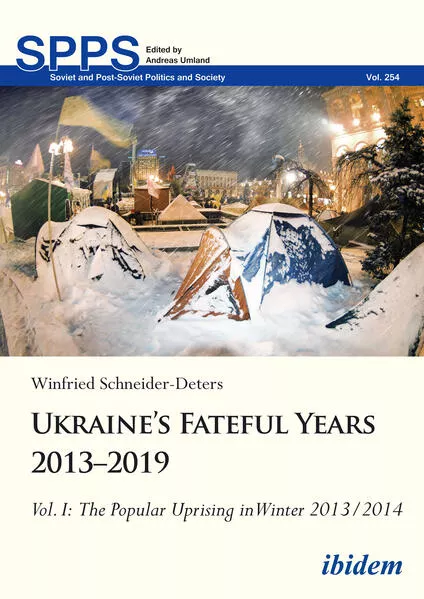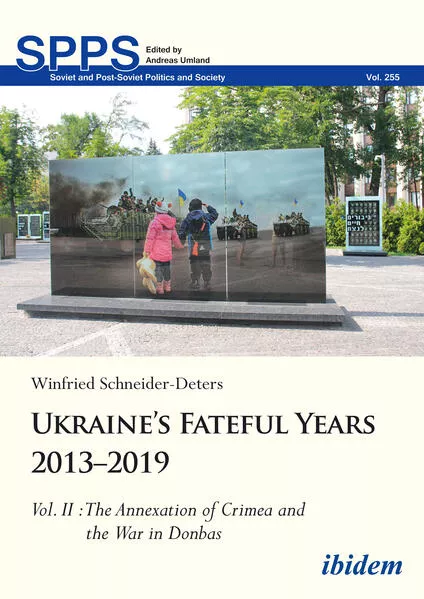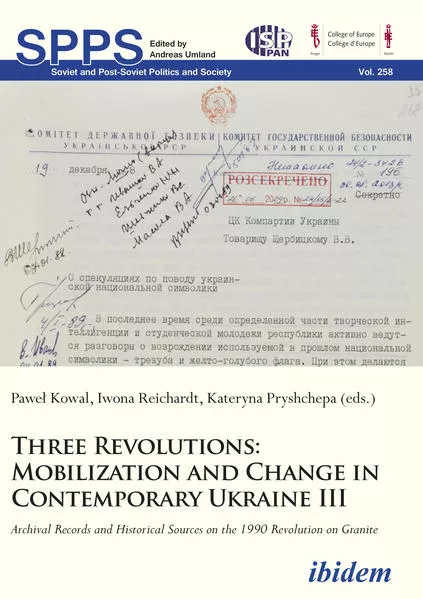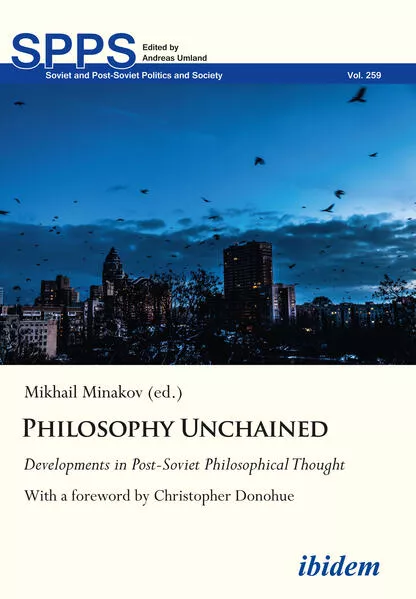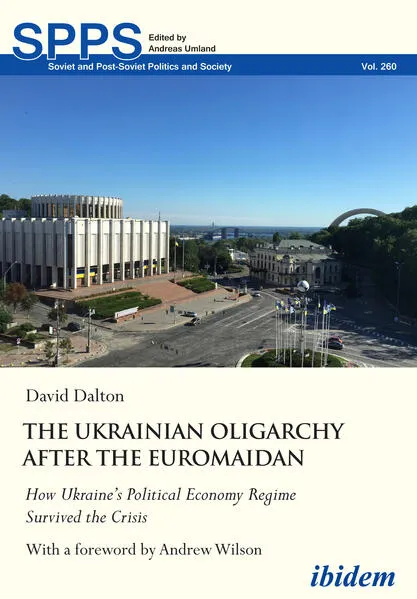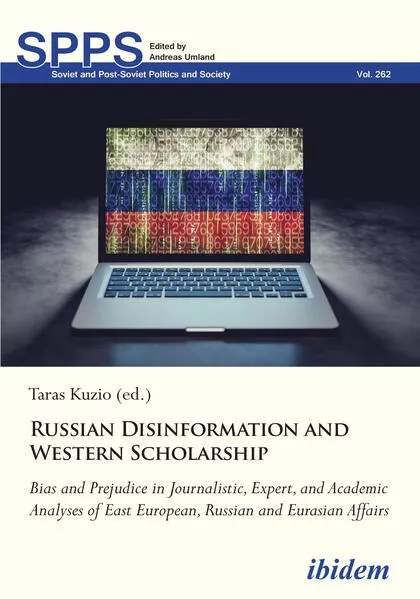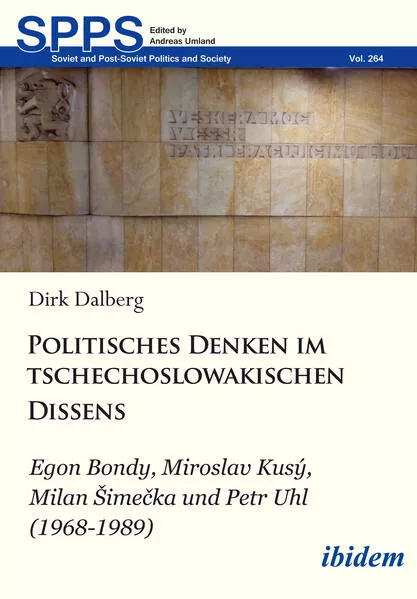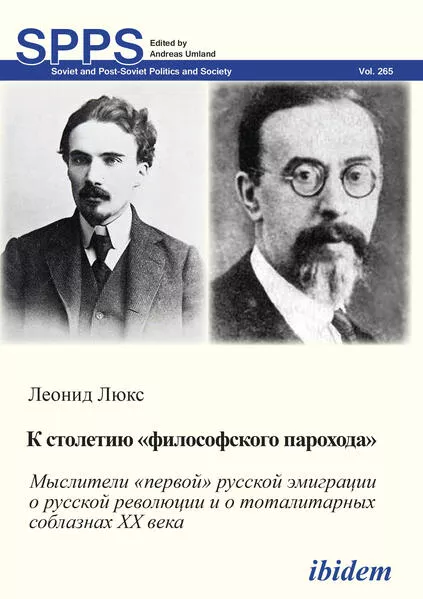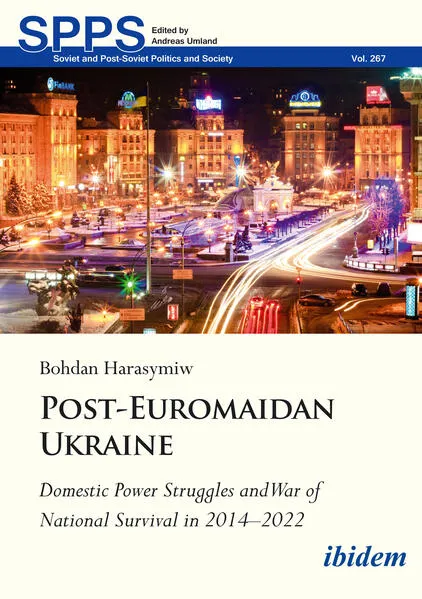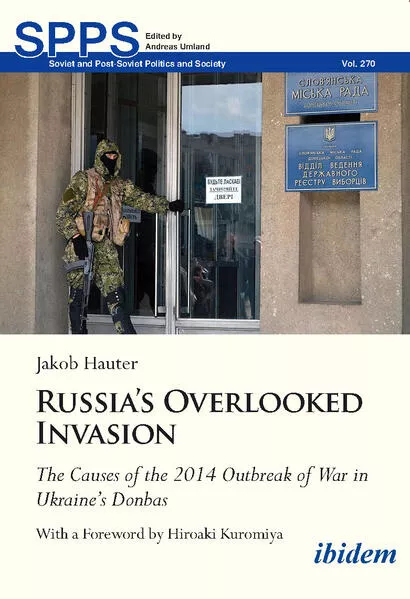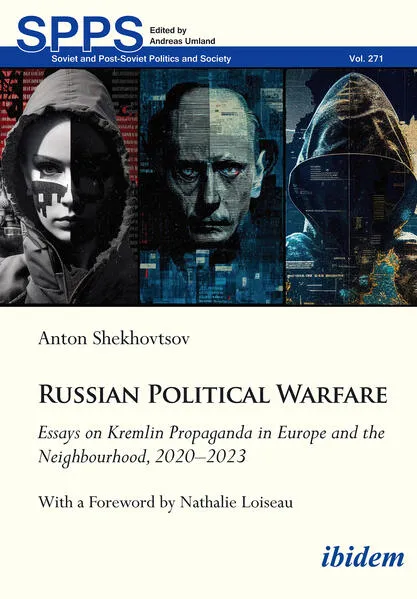Chronologie aller Bände (1 - 51)
Die Reihenfolge beginnt mit dem Buch "Russian Cultural Diplomacy under Putin". Wer alle Bücher der Reihe nach lesen möchte, sollte mit diesem Band von Alexander Sergunin beginnen. Der zweite Teil der Reihe "Aleksandr Prokhanov and Post-Soviet Esotericism" ist am 23.01.2023 erschienen. Mit insgesamt 51 Bänden wurde die Reihe über einen Zeitraum von ungefähr 10 Jahren fortgesetzt. Der neueste Band trägt den Titel "Contested Language Diversity in Wartime Ukraine".
- Anzahl der Bewertungen für die gesamte Reihe: 24
- Ø Bewertung der Reihe: 4.61
- Start der Reihe: 01.01.2015
- Neueste Folge: 01.03.2025
Diese Reihenfolge enthält 42 unterschiedliche Autoren.
- Autor: Koval, Nadiia / Tereshchenko, Denys
- Anzahl Bewertungen: 2
- Ø Bewertung: 5.0
- Medium: Buch
- Veröffentlicht: 13.11.2023
- Genre: Politik
Russian Cultural Diplomacy under Putin
- Autor: Mtchedlishvili, Daviti
- Anzahl Bewertungen: 0
- Ø Bewertung:
- Medium: Buch
- Veröffentlicht: 08.01.2024
- Genre: Politik
The EU and the South Caucasus: European Neighborhood Policies between Eclecticism and Pragmatism, 1991-2021
The study’s findings show that the complex relationship between the EU and the South Caucasus states cannot be explained through either a purely constructivist or a purely rationalist theoretical framework. Both, material and social motives are discernible. Thus, rationalism and constructivism are complementary tools for explaining the relations between the EU and South Caucasus countries. The rationalist perspective explains actors’ preferences towards maximizing material utility and calculations by EU policymakers as to which strategy is most likely to advance the immediate interests of the EU in a given situation. This argument needs to be supplemented, however, with insights from constructivism. This approach emphasizes the universal nature of the values of the EU which are linked to internal dynamics in the EU and manifest themselves in the Union’s relations with neighboring countries.
The book finally illustrates how rational considerations, related to Russia’s political and economic activities in the region, have determined the stances of the South Caucasus countries towards the EU.
- Autor: Dubrovskyi, Volodymyr
- Anzahl Bewertungen: 0
- Ø Bewertung:
- Medium: Buch
- Veröffentlicht: 26.02.2024
- Genre: Politik
Eight Years after the Revolution of Dignity
- Autor: Schneider-Deters, Winfried
- Anzahl Bewertungen: 0
- Ø Bewertung:
- Medium: Buch
- Veröffentlicht: 08.04.2024
- Genre: Politik
Russia's War in Ukraine
- Autor: Umland, Andreas
- Anzahl Bewertungen: 0
- Ø Bewertung:
- Medium: Buch
- Veröffentlicht: 06.05.2024
- Genre: Politik
Ukraine’s Decentralization
After Ukraine’s 2013–14 Revolution of Dignity, much Western attention to Ukrainian domestic policies has been focused on the country’s “Europeanization” in the narrow and technical sense of the word, i.e. to its adoption of EU standards and legislation. In contrast, a parallel major transformation with no direct relation to Ukraine’s EU association and accession—a multidimensional local governance and territorial reform—has been receiving less journalistic and scholarly coverage. That is in spite of the fact that the gradual decentralization process that Ukraine’s first post-Euromaidan government started in April 2014 is an exceptionally far-ranging and already advanced transition. It redefines not only Ukrainian center-periphery interactions, but also state-society as well as government-citizen relations.
This collected volume is one of the first of its kind and presents eleven narrowly focused research papers by Oleksandra Deineko, Melanie Mierzejewski-Voznyak, Maryna Rabinovych, Aadne Aasland, Max Bader, Igor Dunayev, Yuriy Palekha, Oleksii Sydorchuk, and the editors. The chapters illustrate specific problems as well as repercussions of Ukraine’s ongoing local governance reform ranging from fiscal governance to party politics as well as wartime challenges.
- Autor: Furmonavicius, Darius
- Anzahl Bewertungen: 0
- Ø Bewertung:
- Medium: Buch
- Veröffentlicht: 13.05.2024
- Genre: Politik
Lithuania Transforms the West
- Autor: Heinemann-Grüder, Andreas
- Anzahl Bewertungen: 0
- Ø Bewertung:
- Medium: Buch
- Veröffentlicht: 24.06.2024
- Genre: Politik
Who Are the Fighters?
- Autor: Kresin, Oleksiy V.
- Anzahl Bewertungen: 0
- Ø Bewertung:
- Medium: Buch
- Veröffentlicht: 01.07.2024
- Genre: Politik
United Nations General Assembly Resolutions
The author analyzes the UN General Assembly resolutions from 2014 through 2023 on the territorial integrity of Ukraine, condemnation of the armed aggression of the Russian Federation, war crimes committed by its political and military leadership and Russian citizens, the legal responsibility of the Russian Federation and its citizens, as well as the parameters of a future just and lasting peace.
- Autor: Hauter, Jakob
- Anzahl Bewertungen: 0
- Ø Bewertung:
- Medium: Buch
- Veröffentlicht: 08.07.2024
- Genre: Politik
Russlands unbemerkte Invasion
Der Krieg in der Ukraine begann nicht am 24. Februar 2022. Er begann acht Jahre zuvor in der ostukrainischen Donbas-Region.
In seinem vielbeachteten Buch untersucht Jakob Hauter die Eskalation der Gewalt im Frühjahr und Sommer 2014. Er zeigt, dass es sich bei dem Konflikt auch bereits vor 2022, entgegen der landläufigen Meinung, nicht um einen Bürgerkrieg handelte.
Die Ukraine kämpft seit Beginn des bewaffneten Konflikts gegen eine russische Invasion. Zu diesem Schluss gelangt Hauter nach einer gründlichen Auswertung öffentlich verfügbarer digitaler Quellen. Er argumentiert, dass das Internet nicht bloß ein Ort für Propaganda und Desinformation, sondern ebenfalls eine Fundgrube für wertvolle Originalquellen ist. Mit der richtigen Herangehensweise kann sich die Wissenschaft diese Fundgrube zunutze machen.
Als theoretische Grundlage entwickelt Hauter ein Modell, dass die Eskalation des Donbas-Krieges im Jahr 2014 in sechs Wendepunkte unterteilt. Anschließend untersucht er die Ursachen jedes einzelnen Wendepunkts im Hinblick auf die involvierten Akteure und ihre Handlungen. Dabei wägt er die verfügbaren Beweise für lokalen Separatismus und die Beweise für russische Intervention gegeneinander ab. Er kommt zu dem Schluss, dass es in den meisten Fällen überzeugende Belege dafür gibt, dass das Handeln des russischen Staates der Hauptgrund für die Eskalation der Gewalt war.
Hauters Buch ist wichtige Lektüre für alle, die der Frage, was 2014 in der Ostukraine geschehen ist, auf den Grund gehen wollen. Er bringt uns darin zudem vielversprechende neue Herangehensweisen für die Konfliktforschung im Zeitalter der sozialen Medien nahe.
Dieses Buch ist die vom Autor selbst angefertigte Übersetzung der englischen Originalausgabe Russia’s Overlooked Invasion: The Causes of the 2014 Outbreak of War in Ukraine’s Donbas.
- Autor: Minakov, Mykhailo
- Anzahl Bewertungen: 0
- Ø Bewertung:
- Medium: Buch
- Veröffentlicht: 29.07.2024
- Genre: Politik
The Post-Soviet Human
- Autor: Moisé, Gian Marco
- Anzahl Bewertungen: 0
- Ø Bewertung:
- Medium: Buch
- Veröffentlicht: 01.08.2024
- Genre: Politik
The House Always Wins
Using Kazakhstan as a case study, Gian Marco Moisé explores the various ways in which corruption and informal governance converged and were shaped by the everchanging power dynamics between the different actors participating in the industry. Complemented by discussions on other rentier economies, each practice of the taxonomy is presented as a specific strategy employed by the predatory elite to achieve different governance objectives. As these practices normalize, their effects trickle down into an increasing inequality that contributes to the generalized informality of the lowest ranks of the industry.
- Autor: Deutschland e.V., Memorial
- Anzahl Bewertungen: 1
- Ø Bewertung: 5.0
- Medium: Buch
- Veröffentlicht: 10.10.2024
- Genre: Politik
»Alles kann sich ändern«
»Wir werden alle darauf trainiert, Angst zu haben«, sagte Maria Aljochina von der Punkband Pussy Riot in ihrem letzten Wort vor Gericht 2021 in Moskau. »Aber ein Käfig aus Angst ist schlimmer als ein Käfig aus Glas und Eisen. Man muss die Einstellung ›Ich kann ja doch nichts bewirken‹ ablegen und Verantwortung übernehmen.«
In den letzten Jahren hat die Staatsmacht in Russland die Repressionen immer weiter verschärft. Parallel zum umfassenden russischen Angriffskrieg gegen die Ukraine hat die Staatsduma neue Straftatbestände geschaffen, und immer mehr Menschen geraten in das Räderwerk der Verfolgung. Dennoch gibt es Menschen, die ihre Angst überwinden, sich für eine bessere Zukunft einsetzen und offen ihre Meinung sagen.
Dieses Buch versammelt 29 letzte Worte von politischen Gefangenen, die aus ganz unterschiedlichen Gründen angeklagt wurden. Ein letztes Wort steht in Russland jeder und jedem Angeklagten zu, bevor das Urteil verkündet wird. Diese Reden vermitteln Einblicke in die sehr unterschiedlichen Lebenswelten ihrer Protagonisten, deren Anliegen und deren Haltung zum Gericht. Einige sind rhetorische Meisterwerke – mutig sind sie alle.
- Autor: Kaunert, Christian
- Anzahl Bewertungen: 0
- Ø Bewertung:
- Medium: Buch
- Veröffentlicht: 11.11.2024
- Genre: Politik
In the Eye of the Storm
This volume focuses on a highly controversial unit within the Ukrainian military, the Azov (former regiment) Brigade. Azov is known for its far-right origins but has garnered worldwide attention through its role in the defense of Mariupol in 2022. There is still confusion and obfuscation about the Azov Brigade’s development since 2014 and its status today. Many conflate the unit and political Azov Movement, with the latter emerging later and using the success of the former as a launchpad for public attention. The contributors examine Azov’s ideology, its roles, and the controversies around the unit. They scrutinize the history and evolution of the unit from creation to today. The contributors include Rosaria Puglisi, Bertrand de Franqueville, Ivan Gomza, Mollie Saltskog, Kacper Rekawek, Taras Tarasiuk, Petro Burkovskiy, and Przemysław Witkowski.
- Autor: Nilsson, Rasmus
- Anzahl Bewertungen: 0
- Ø Bewertung:
- Medium: Buch
- Veröffentlicht: 02.12.2024
- Genre: Politik
Uncanny Allies
This book challenges widespread academic and media claims that Russia and Belarus are unwavering allies or that Russia has unquestioned control over Belarus. Instead, Belarus plays at least four different roles within Russian foreign policy. First, Belarus is sometimes a conduit for Russian power projection towards Western enemies. Second, Belarus is sometimes a supporter in Russian attempts to centralize the post-Soviet space around itself. Third, Belarus is sometimes itself an object of Russian economic ambition or even greed. Fourth, however, Belarus also presents a source of danger and vulnerability to Russian physical and, perhaps more importantly, ontological security. Many scholars have pointed out the historical and contemporary importance of Ukraine for Russian self-understanding and external projection. Belarus, too, has such importance. Whether it be as a millennium-old „grey zone“ between Russia and what it saw as its ideological and military enemies, or whether it be as the place where the „most perfect“ Soviet republic was created, the Belarusian lands today present themselves to Russia simultaneously as open to the passage of alien subversive influences and as a place claiming to be the real heir to Soviet victory and to Slavic purity – both mantles otherwise claimed by Russia.
- Autor: Umland, Andreas
- Anzahl Bewertungen: 0
- Ø Bewertung:
- Medium: Buch
- Veröffentlicht: 03.02.2025
- Genre: Politik
War and the Transformation of Ukrainian Society (2022–23)
This book examines the profound transformation that has occurred in Ukrainian society as a result of Russia’s large-scale invasion of Ukraine on February 24th, 2022. The authors—two renowned sociologists and directors of the Kyiv International Institute of Sociology—document and explain the post-Soviet evolution of Ukrainians’ views, values, and behavior. Utilizing data from hundreds of opinion surveys from 1991 to 2023, they analyze how the war affected the formation of Ukrainian national identity, geopolitical orientations, society’s readiness to resist, attitudes towards the state and its institutions, as well as other aspects.
This timely study highlights socio-economic transitions, migration moods, the moral-psychological state of the population as well as the changing media and Internet consumption among Ukrainians. It also examines the thorny issue of possible social tension that may arise in post-war Ukraine.
The volume is not only an invaluable source of public opinion data, but also constitutes a basis for further analysis of the post-war reality. It offers an essential tool for understanding the challenges and opportunities facing Ukraine on its path to recovery and development. Most of the data from the studies used have been transferred to the National Data Bank “Kyiv Archive”, which provides scholars with the opportunity to conduct more detailed research.
- Autor: Reichardt, Iwona
- Anzahl Bewertungen: 0
- Ø Bewertung:
- Medium: Buch
- Veröffentlicht: 10.02.2025
- Genre: Politik
The End of the Soviet World? Essays on Post-Communist Political and Social Change
This is the fourth volume prepared by the initiators of the Three Ukrainian Revolutions (3R) project ongoing at the College of Europe in Natolin since 2016. The present collection of essays analyses the changes that have taken place in the post-Soviet space since 1991 and which have determined both the process of democratization and the return to authoritarianism in the new republics. Since 2022, researchers gathered around the 3R project have been asked: Had there been no revolutions and mass pro-democratic protest in Ukraine and other post-Soviet states, would there also be no war today? Answers to this and similarly intriguing questions are provided by: Marek Cichocki, Kinga Anna Gajda, Garry Kasparov, Magdalena Lachowicz, Wojciech Michnik, Georges Mink, Justyna Olędzka, Iwona Reichardt, Anton Saifullayeu, Kacper Wańczyk, Andrew Wilson and Kataryna Wolczuk.
- Autor: Ottinger, Richard
- Anzahl Bewertungen: 1
- Ø Bewertung: 4.0
- Medium: Buch
- Veröffentlicht: 10.02.2025
- Genre: Politik
Religiöse Elemente im russischen Angriffskrieg gegen die Ukraine
Der Band versammelt Beiträge von Autoren aus den Fächern der Politikwissenschaft, Ökumenik, Theologie, Geschichte, Soziologie und Ethik. Alle Beiträge verbindet die Grundannahme, dass der russische Angriffskrieg auf die Ukraine zwar kein Religionskrieg ist, aber ohne die Berücksichtigung und Analyse religiöser Elemente und Begründungszusammenhänge nicht verstanden werden kann.
- Autor: Ottinger, Richard
- Anzahl Bewertungen: 0
- Ø Bewertung:
- Medium: Buch
- Veröffentlicht: 10.02.2025
- Genre: Politik
Religious Elements in the Russian War of Aggression Against Ukraine
This volume assembles contributions by authors from the fields of political science, ecumenics, theology, history, sociology, and ethics. All contributions are united by the basic assumption that although the Russian war of aggression against Ukraine is not a War of Religion, but it cannot be understood without considering and analysing the religious elements and contexts of justification.
- Autor: Kiss, Nadiya
- Anzahl Bewertungen: 0
- Ø Bewertung:
- Medium: Buch
- Veröffentlicht: 01.03.2025
- Genre: Politik
Contested Language Diversity in Wartime Ukraine
This collected volume focuses on the language situation in wartime Ukraine. The research employs the methods of language biography, linguistic landscape as well as media and discourse analysis. The contributions depict a holistic picture of the language situation, use, and attitudes. The volume’s novelty is in presenting rich empirical data and a detailed description of various linguistic minorities in Ukraine (Hungarians, Romanians, Gagauz, and others), their language behavior and attitudes towards state and regional language policy. The language biography interview and sociolinguistic survey data shed light on the processes of language shifts that occur in Ukraine and are accelerated by the war situation. Furthermore, the volume elucidates the impact of the war on the language situation and compares national and regional perspectives of language use. The volume’s contributors are: Bohdan Azhniuk, Ivanna Car, Maryna Deliusto, Lesia Hychko, Nadiya Kiss, Andrii Kolesnykov, , Nataliia Matvieeva, Svitlana Nemyrovska, Anastasiia Onatii, Liudmyla Pidkuimukha, Olena Ruda, Vasyl Sharkan, Halyna Shumytska, Svitlana Sokolova, and Taras Tkachuk.
- Band: 147
- Autor: Sergunin, Alexander
- Anzahl Bewertungen: 2
- Ø Bewertung: 4.5
- Medium: Buch
- Veröffentlicht: 01.01.2015
- Genre: Politik
Explaining Russian Foreign Policy Behavior
- Band: 158
- Autor: Griffiths, Edmund
- Anzahl Bewertungen: 0
- Ø Bewertung:
- Medium: Buch
- Veröffentlicht: 23.01.2023
- Genre: Politik
Aleksandr Prokhanov and Post-Soviet Esotericism
This book does not seek either to justify Prokhanov or to denounce him: It seeks to understand him as perhaps the most eminent representative of a school of thought that is here defined as ‘post-Soviet esotericism’. Esotericist ideas, some of them strikingly reminiscent of beliefs that flourished in the early Christian centuries, have acquired wide resonance in Russia since the collapse of the USSR. Post-Soviet esotericism thus represents a rare and valuable opportunity to examine a belief system of this nature in the process of its emergence. The book will be of interest to anyone concerned with modern Russian literature or politics, and also more broadly to descriptive logicians and students of negative esotericism."
- Band: 170
- Autor: Vit, Michal
- Anzahl Bewertungen: 0
- Ø Bewertung:
- Medium: Buch
- Veröffentlicht: 30.09.2017
- Genre: Sonstiges
Transregional versus National Perspectives on Contemporary Central European History
- Band: 179
- Autor: Minakov, Mikhail
- Anzahl Bewertungen: 0
- Ø Bewertung:
- Medium: Buch
- Veröffentlicht: 30.03.2018
- Genre: Sonstiges
Development and Dystopia
- Band: 197
- Autor: Leukavets, Alla
- Anzahl Bewertungen: 1
- Ø Bewertung: 4.0
- Medium: Buch
- Veröffentlicht: 27.02.2023
- Genre: Politik
The Integration Policies of Belarus and Ukraine vis-à-vis the EU and Russia
- Band: 214
- Autor: Huseynov, Vasif
- Anzahl Bewertungen: 1
- Ø Bewertung: 5.0
- Medium: Buch
- Veröffentlicht: 20.11.2019
- Genre: Sonstiges
Geopolitical Rivalries in the “Common Neighborhood”
- Band: 220
- Autor: Umland, Andreas
- Anzahl Bewertungen: 0
- Ø Bewertung:
- Medium: Buch
- Veröffentlicht: 17.07.2023
- Genre: Politik
Political Uncertainty
- Band: 229
- Autor: Schmies, Oxana
- Anzahl Bewertungen: 0
- Ø Bewertung:
- Medium: Buch
- Veröffentlicht: 30.04.2021
- Genre: Sonstiges
NATO’s Enlargement and Russia
This collection of essays and analyses by prominent politicians, diplomats, and scholars from the US, Russia, and Europe provides personal perspectives on the sources of the Russian-Western estrangement. They draw on historical experience, including the Russian-Western controversies that intensified with NATO's eastward expansion in the 1990s, and reflect on possible perspectives of reconcilitation within the renewed transatlantic relationship.
The volume touches upon alleged and real security guarantees for the countries of Eastern and Central Europe as well as past and current deficits in the Western strategy for dealing with an increasingly hostile Russia. Thus, it contributes to the ongoing Western debate on which policies towards Russia can help to overcome the deep current divisions and to best meet Europe’s future challenges.
- Band: 238
- Autor: Pohl, Jonathan Otto
- Anzahl Bewertungen: 13
- Ø Bewertung: 5.0
- Medium: Buch
- Veröffentlicht: 22.03.2022
- Genre: Politik
The Years of Great Silence
J. Otto Pohl traces the development of Soviet repression of ethnic Germans. In particular, he focuses on the years 1941 to 1955 during which this oppression reached its peak. These years became known as “the Years of Great Silence” (“die Jahre des grossen Schweigens”). In fact, until the era of glasnost (transparency) and perestroika (rebuilding) in the late 1980s, the events that defined these years for the Soviet Germans could not be legally researched, written about, or even publicly spoken about, within the USSR.
- Band: 239
- Autor: Minakov, Mikhail
- Anzahl Bewertungen: 0
- Ø Bewertung:
- Medium: Buch
- Veröffentlicht: 22.03.2022
- Genre: Politik
Inventing Majorities
In this collected volume, an international group of contributors delves deeper into recent theoretical constructions of various post-Soviet majorities, the ideologies that justify them, and some respectively formulated policy prescriptions.
The first part analyzes post-Soviet state-builders’ fixation on certain constructed majorities as well as on these imagined communities’ symbolic self-identifications, in- or outward othering, and national languages. The second part deals specifically with post-Soviet ideas of sovereigntism and the way they define majorities as well as imply changes in internal and external policies and legal systems. These processes are analyzed in comparison to similar phenomena in Western societies.
The book’s contributors include (in the order of their appearance): Natalia Kudriavtseva, Petra Colmorgen, Nadiia Koval, Ivan Gomza, Augusto Dala Costa, Roman Horbyk, Yana Prymachenko, Yuliya Yurchuk, Oleksandr Fisun, Nataliya Vinnykova, Ruslan Zaporozhchenko, Mikhail Minakov, Gulnara Shaikhutdinova, and Yurii Mielkov.
- Band: 240
- Autor: Cutler, Robert M.
- Anzahl Bewertungen: 0
- Ø Bewertung:
- Medium: Buch
- Veröffentlicht: 26.04.2022
- Genre: Politik
Soviet and Post-Soviet Foreign Policies I
- Band: 242
- Autor: Schäffer, Sebastian
- Anzahl Bewertungen: 0
- Ø Bewertung:
- Medium: Buch
- Veröffentlicht: 06.09.2022
- Genre: Politik
Ukraine in Central and Eastern Europe
This volume examines which interests and motivations some select countries in East-Central Europe and the Caucasus have towards Ukraine and provides answers to the question which chances there are for new multilateral networks or structures. Such multilateralism around Ukraine could go beyond the already existing, yet geographically and functionally circumscribed Organization for Democracy and Economic Development (GUAM), the Visegrad Four, the Bucharest Nine Group, and the Three Seas Initiative.
The volume also illustrates how the ever-present “elephant in the room”—Russia—shapes the international relations of the post-Soviet space. Researchers from several post-communist countries examine these issues from their specific points of view.
- Band: 244
- Autor: Filipova, Rumena
- Anzahl Bewertungen: 0
- Ø Bewertung:
- Medium: Buch
- Veröffentlicht: 30.04.2022
- Genre: Politik
Constructing the Limits of Europe
Rumena Filipova argues that Poland’s, Bulgaria’s, and Russia’s dominating conceptions of national identity have principally shaped these countries’ foreign policy behavior after 1989. Such an explanation of these three nations’ diverging degrees of Europeanization stands in contrast to institutionalist-rationalist, interest-based accounts of democratic transition and international integration in post-communist Europe.
She thereby makes a case for the need to include ideational factors into the study of International Relations and demonstrates that identities are not easily malleable and may not be as fluid as often assumed. She proposes a theoretical “middle-ground” argument that calls for “qualified post-positivism” as an integrated perspective that combines positivist and post-positivist orientations in the study of IR.
- Band: 245
- Autor: Keudel, Oleksandra
- Anzahl Bewertungen: 0
- Ø Bewertung:
- Medium: Buch
- Veröffentlicht: 26.04.2022
- Genre: Politik
How Patronal Networks Shape Opportunities for Local Citizen Participation in a Hybrid Regime
This argument is based on an in-depth comparative analysis of patronal network arrangements and the adoption of citizen participation mechanisms in five urban municipalities in Ukraine during 2015–2019: Chernivtsi, Kharkiv, Kropyvnytskyi, Lviv, and Odesa. Fifty-seven interviews with citizen participation experts, local politicians and officials, representatives of civil society and the media, as well as utilization of secondary analytical sources, official government data, and media reports provide a rich basis for an investigation of context-specific choices of municipal leaders that result in varying mechanisms for citizen participation.
- Band: 247
- Autor: Luks, Leonid
- Anzahl Bewertungen: 0
- Ø Bewertung:
- Medium: Buch
- Veröffentlicht: 18.04.2022
- Genre: Politik
Macht und Ohnmacht der Utopien: Essays zur Geschichte Russlands im 20. und 21. Jahrhundert
70 Jahre später erlebte indes die bolschewistische Vision von der „lichten kommunistischen Zukunft“ eine gänzliche Erosion. So gut wie niemand nahm sie noch ernst – weder die Herrscher noch die Beherrschten. Das nun entstandene legitimatorische Vakuum konnte nur durch die Rückkehr der demokratischen Institutionen gefüllt werden, die die Bolschewiki kurz nach ihrer Machtübernahme von der politischen Bühne Russlands verjagt hatten. Dies ist in der Gorbatschow-Periode auch teilweise geschehen. Der Versuch der kommunistischen Dogmatiker, diesen Prozess rückgängig zu machen, scheiterte im August 1991 kläglich. Aber einige Jahre später verspielten auch die siegreichen Demokraten weitgehend ihr Vertrauenskapital. Damals begann man in Ost und West wiederholt, Parallelen zwischen der Weimarer Republik und dem postsowjetischen Russland zu ziehen.
Diesen Entwicklungen sind die Beiträge des vorliegenden Bandes gewidmet.
- Band: 248
- Autor: Barshadska, Iuliia
- Anzahl Bewertungen: 0
- Ø Bewertung:
- Medium: Buch
- Veröffentlicht: 04.04.2022
- Genre: Politik
Brüssel zwischen Kyjiw und Moskau: Das auswärtige Handeln der Europäischen Union im ukrainisch-russischen Konflikt 2014-2019
Auf Grundlage eines Prinzipal-Agenten-Modells und des Actorness-Ansatzes werden verschiedene Problemfelder, mit denen sich die EU auseinandersetzen musste, analysiert. In welchem Maße und auf welche Art gelang beziehungsweise misslang es der Union ihre Akteursrolle in Krisen- und Konfliktsituationen zu stärken sowie ihre außenpolitische Autonomie zu erhöhen? Diese theoriegeleitete politik-, verwaltungs- und rechtswissenschaftliche Fallstudie leistet einen quellen- und datengesättigten Beitrag zur laufenden Diskussion über Delegationsbeziehungen innerhalb der EU sowie ihre Handlungsfähigkeit bei der Beilegung internationaler Konflikte.
- Band: 249
- Autor: Romanova, Valentyna
- Anzahl Bewertungen: 0
- Ø Bewertung:
- Medium: Buch
- Veröffentlicht: 31.10.2022
- Genre: Politik
Decentralization and Multilevel Elections in Ukraine
Methodologically, the book illustrates the added value of investigating elections from a multilevel perspective. It contributes to the comparative exploration of party systems change over time, and constitutes a case study of more general patterns of interaction between municipal decentralization and political development in democratizing states.
- Band: 250
- Autor: Motyl, Alexander
- Anzahl Bewertungen: 0
- Ø Bewertung:
- Medium: Buch
- Veröffentlicht: 03.10.2022
- Genre: Politik
National Questions: Theoretical Reflections on Nations and Nationalism in Eastern Europe
- Band: 251
- Autor: Dietrich, Marc
- Anzahl Bewertungen: 0
- Ø Bewertung:
- Medium: Buch
- Veröffentlicht: 06.03.2023
- Genre: Politik
A Cosmopolitan Model for Peacebuilding: The Ukrainian Cases of Crimea and the Donbas
- Band: 252
- Autor: Baidaus, Eduard
- Anzahl Bewertungen: 1
- Ø Bewertung: 4.0
- Medium: Buch
- Veröffentlicht: 27.03.2023
- Genre: Politik
An Unsettled Nation: State-Building, Identity, and Separatism in Post-Soviet Moldova
This book investigates state-building, distorted identities, and separatism in the Republic of Moldova. It presents research on the historical preconditions and spread of the secessionist movement in Transnistria, the war in the Dniester River valley, and the diplomatic deadlock of the Transnistrian problem. It examines the conflicting positions that political parties, the public, and experts have taken towards the problems that challenge the nation- and state-building processes in this post-Soviet state. Additional focal points include the reassertion of Russia’s power in the post-Soviet space, Ukraine’s effort to become a major political player in the region, and Romania’s attempt to retrieve its influence in Moldova.
This study demonstrates that separatism generates mutually exclusive nation-building projects on the territory of a single state, that international actors play a significant role in this process, and that domestic and external factors hinder the development of a resolution of the so-called "frozen conflict" over Transnistria.
Honorable Mention, 2024 Taylor and Francis Book Prize in Slavic, East European, and Eurasian Studies, Canadian Association of Slavists.
- Band: 253
- Autor: Okunev, Igor
- Anzahl Bewertungen: 0
- Ø Bewertung:
- Medium: Buch
- Veröffentlicht: 22.11.2022
- Genre: Politik
Transforming the Administrative Matryoshka: The Reform of Autonomous Okrugs in the Russian Federation, 2003–2008
- Band: 254
- Autor: Schneider-Deters, Winfried
- Anzahl Bewertungen: 0
- Ø Bewertung:
- Medium: Buch
- Veröffentlicht: 21.11.2022
- Genre: Politik
Ukraine’s Fateful Years 2013–2019: Vol. I: The Popular Uprising in Winter 2013/2014
This popular uprising against the kleptocratic regime of President Viktor Yanukovych led to a takeover of power by the parliamentary opposition—and to a total loss of influence by Russia. While regular Russian troops were deploying along the border, Russian agents in eastern Ukraine tried to bring about a “Crimea scenario,” i. e. the secession of the eastern part of the country. President Putin intended to resolve the “Ukraine conflict”—in truth not a “civil war” but a Russian war of attrition against Ukraine—on his terms within the “Minsk process.” By creating an “autonomous” Donbas region within the Ukrainian state, he wanted to create a lever for Russian influence over the whole of Ukraine. The book’s conclusions place the Russian-Ukrainian conflict in the context of the dawning “Chinese century.”
The in-depth study draws from secondary literature, official publications, and a variety of current news in print and digital outlets. It is essential reading for everyone who wants to understand the current situation in Ukraine.
- Band: 255
- Autor: Schneider-Deters, Winfried
- Anzahl Bewertungen: 0
- Ø Bewertung:
- Medium: Buch
- Veröffentlicht: 21.11.2022
- Genre: Politik
Ukraine’s Fateful Years 2013–2019: Vol. II: The Annexation of Crimea and the War in Donbas
This popular uprising against the kleptocratic regime of President Viktor Yanukovych led to a takeover of power by the parliamentary opposition—and to a total loss of influence by Russia. While regular Russian troops were deploying along the border, Russian agents in eastern Ukraine tried to bring about a “Crimea scenario,” i. e. the secession of the eastern part of the country. President Putin intended to resolve the “Ukraine conflict”—in truth not a “civil war” but a Russian war of attrition against Ukraine—on his terms within the “Minsk process.” By creating an “autonomous” Donbas region within the Ukrainian state, he wanted to create a lever for Russian influence over the whole of Ukraine. The book’s conclusions place the Russian-Ukrainian conflict in the context of the dawning “Chinese century.”
The in-depth study draws from secondary literature, official publications, and a variety of current news in print and digital outlets. It is essential reading for everyone who wants to understand the current situation in Ukraine.
- Band: 258
- Autor: Kowal, Pawel
- Anzahl Bewertungen: 0
- Ø Bewertung:
- Medium: Buch
- Veröffentlicht: 01.09.2022
- Genre: Politik
Three Revolutions: Mobilization and Change in Contemprary Ukraine III
The publication completes two earlier SPPS volumes: Three Revolutions: Mobilization and Change in Contemporary Ukraine I – Theoretical Aspects and Analyses on Religion, Memory, and Identity edited by Paweł Kowal, Georges Mink, and Iwona Reichardt (2019), and Three Revolutions: Mobilization and Change in Contemporary Ukraine II – An Oral History of the Revolution on Granite, Orange Revolution, and Revolution of Dignity edited by Paweł Kowal, Georges Mink, Iwona Reichardt, and Adam Reichardt (2019).
- Band: 259
- Autor: Minakov, Mykhailo
- Anzahl Bewertungen: 0
- Ø Bewertung:
- Medium: Buch
- Veröffentlicht: 23.01.2023
- Genre: Politik
Philosophy Unchained
This volume’s chapters analyze the renewal of the philosophical enterprise over the last thirty to forty years, in Belarus, Georgia, Latvia, Lithuania, Moldova, Russia, Ukraine, and Uzbekistan. Among its authors are Yevgeniy Abdullaev, Viktoras Bakhmetjevas, Alexandru Cosmescu, Maija Kule, Denys Kiryukhin, Giorgi Khuroshvili, Mikhail Maiatsky, Tatyana Shchittsova, and Mikhail Minakov.
"This book is a long-needed assessment of the transformations of philosophy after the fall of the Soviet Union, when a wide range of possibilities opened up for philosophical thinking."
—Daniela Steila, University of Turin
"This book offers an excellent handle with which to grasp the inherent difficulty of reconciling states, civil societies, and academic knowledge in fraught national settings."
—Diana Pinto, Historian
"Nothing can help us more incisively than this book to grasp how thinking, though imperceptible and immaterial, can be put and kept in chains or can suddenly break free from chains."
—Alessandro Ferrara, University of Rome Tor Vergata
"The book offers new and original cartography of the post-Soviet intellectual space and its development."
—Nikolaj Plotnikov, Ruhr-University Bochum
"But what happened to philosophy in Soviet hands when the Soviet Union faded away? The answer is in this volume."
—Ivan Krastev, Centre for Liberal Strategies in Sofia
"The book is a must-read not only for those who are interested in a deep understanding of post-Soviet philosophy, its history, and its place in the world but also for those who want to truly explore the inner side of post-Soviet being and consciousness."
—Julie Reshe, University College Cork and University College Dublin
"It is this overview of the new critical potentials in the post-Communist East that makes the book an obligatory reading for all who care about our common destiny."
—Slavoj Žižek, University of London/University of Ljubljana
- Band: 260
- Autor: Dalton, David
- Anzahl Bewertungen: 0
- Ø Bewertung:
- Medium: Buch
- Veröffentlicht: 27.02.2023
- Genre: Politik
The Ukrainian Oligarchy After the Euromaidan
"This book is ambitious in its scope ... a thoroughgoing empirical study of one of the defining features of politics in Ukraine.”
—Dr Sarah Whitmore, Senior Lecturer in Politics, Oxford Brookes University
"A successful attempt to combine usage of theories of oligarchy and national prosperity."
—Dr Rasmus Nilsson, Lecturer in Russian Politics, SSEES, University College London
- Band: 262
- Autor: Kuzio, Taras
- Anzahl Bewertungen: 0
- Ø Bewertung:
- Medium: Buch
- Veröffentlicht: 18.09.2023
- Genre: Politik
Russian Disinformation and Western Scholarship
The book’s contributors investigate how the Kremlin’s recent turbo-charging of Russia’s information warfare, 24-hour TV, and social media activity has expanded on traditional pro-Russian sentiments among Western academics, experts, and journalists. The authors analyze the downplaying of Russian nationalism, misinterpretations of the 2014 crisis, sympathetic portrayals of Crimea’s occupation, and the use of the term “civil war” rather than “Russian-Ukrainian war” for the Donbas conflict in academia as well as the think tank world and media in the UK, Germany, Poland, Czech Republic, Japan, USA, and Canada.
- Band: 264
- Autor: Dalberg, Dirk Mathias
- Anzahl Bewertungen: 0
- Ø Bewertung:
- Medium: Buch
- Veröffentlicht: 06.03.2023
- Genre: Politik
Politisches Denken im tschechoslowakischen Dissens
Die vier untersuchten Autoren verfassten Schriften, in denen sie sich aus einer marxistischen Perspektive kritisch mit der politischen Gegenwart in ihrer Heimat auseinandersetzten und zu recht ähnlichen Schlüssen gelangten. Darüber hinaus formulierten sie ihre eigenen Vorstellungen von einem besseren politischen System. Während Bondy und Uhl ihren marxistischen Einstellungen auch bei der Formulierung positiver Ideen treu blieben, wandten sich Kusý und Šimečka der im westlichen Europa verwirklichten liberalen Demokratie zu. Das von Dalberg demokratietheoretisch und ideengeschichtlich analysierte Denken ist Ausdruck eines Ideentransfers. Es reflektiert und verarbeitet westliche sowie östliche politische Gedanken und verdeutlicht zugleich Rückbezüge auf ältere tschechische und slowakische Ideen.
- Band: 265
- Autor: Luks, Leonid
- Anzahl Bewertungen: 0
- Ø Bewertung:
- Medium: Buch
- Veröffentlicht: 23.01.2023
- Genre: Politik
K STOLETIIU «FILOSOFSKOGO PAROKHODA». Mysliteli «pervoi» russkoi emigratsii o russkoi revoliutsii i o totalitarnykh soblaznakh 20 veka
- Band: 267
- Autor: Harasymiw, Bohdan
- Anzahl Bewertungen: 0
- Ø Bewertung:
- Medium: Buch
- Veröffentlicht: 16.10.2023
- Genre: Politik
Post-Euromaidan Ukraine
"An important contribution to the literature! There is a lot of interest in Ukraine, and the focus . . . on the past decade or so is so important.”
—Yasmeen Abu-Laban, Professor of Political Science, University of Alberta
- Band: 270
- Autor: Hauter, Jakob
- Anzahl Bewertungen: 2
- Ø Bewertung: 5.0
- Medium: Buch
- Veröffentlicht: 04.09.2023
- Genre: Politik
Russia's Overlooked Invasion
Hauter arrives at this conclusion based on a thorough review of the digital open source information (DOSI) available on the Internet. He argues that social science research needs theoretical and methodological innovation to operate in the abundant but murky information environment surrounding the Donbas War and other conflicts of the social media age. To address this challenge, he develops an escalation sequence model which divides the formative phase of the Donbas War into six critical junctures. He then combines the social science methodology of process tracing with DOSI analysis to investigate the causes of these critical junctures. For each juncture, Hauter assesses the available evidence of domestic causes and Russian interference, reaching the conclusion that, in most cases, there is convincing evidence that Russian involvement was the primary cause of armed escalation.
- Band: 271
- Autor: Shekhovtsov, Anton
- Anzahl Bewertungen: 0
- Ø Bewertung:
- Medium: Buch
- Veröffentlicht: 02.10.2023
- Genre: Politik
